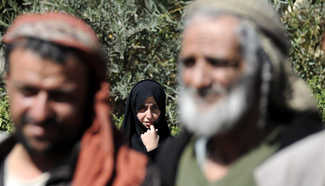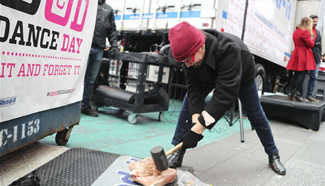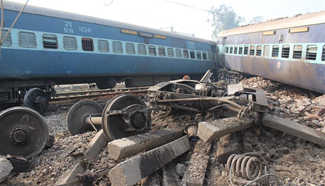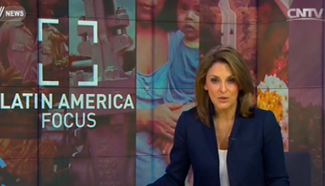by Xinhua writers Lou Chen and Ai Fumei
YINCHUAN, Dec. 28 (Xinhua) -- History likes to repeat itself, perhaps more so in Ningxia Hui Autonomous Region than other parts of China.
In 214 BC, China's first emperor Qinshihuang deployed military forces along the west bank of the Yellow River, including what became Ningxia.
In the following dynasties, migrants continued to arrive to drive away barbarian tribes, farm and build. Migration continued through feudal societies to modern times.
During 2011 to 2015, over 329,000 people in Ningxia left their ancestral homes to live in areas with better land, transportation and more water.
Most were from Xihaigu, a region of six counties in the south of Ningxia, historically and even internationally known for its harsh environment.
"Its bitterness and infertility is the worst under heaven," Zuo Zongtang, a Qing dynasty general said.
"Live in places where there is water and grass." This is a popular saying among farmers eager to escape environmental degradation, climate change and the shackling life of mountains after mountains.
Thus, relocation continues. According to a five-year plan for Ningxia (2016-2020), about 80,000 poverty-stricken people are expected to move.
TREES DIE, BUT PEOPLE LIVE ON
"If you move trees, they die. If you move people, they live on," An Yanlong, a Xihaigu farmer, cited the common saying. He just bought a new home in the suburbs of regional capital Yinchuan, five hours of drive away.
An's old home in Xiangwafu village was spacious cave house. "The bad thing about it is inconvenience. To buy salt or soap, I had to walk five kilometers to the nearest shop," he said.
An spent 12,800 yuan (1,969 U.S. dollars) in 2014 on a 54-square-meter apartment in Binhejiayuan, now home to 16,800 migrants. "I had to build a kitchen and a room for my parents in the yard, It is crowded here," he said.
An's new job keeps him from worrying over the troubles of a small house. Working a raspberry farm, his monthly salary of 3,600 yuan is more than he had hoped for. Raspberries is a trendy but costly topping for cake fans. One small box, containing 20 berries, can sell for 20 yuan at a Beijing fruit market.
"My kids can go to play in the city on weekends and, it is convenient for my parents to go to hospitals, so it is not too bad," said An, 44 years old.
Not all new migrants have desirable jobs, though.
"Moving is the first step, to get out of the poor houses. The second step is to get rich," said Hao Xifen, director of poverty relief office in Yinchuan City.
Hao is canvassing textile companies, dairies and flower growers. In Yinchuan, annual disposable income of these migrants grew from 2,300 yuan (353 U.S. dollars) in 2012 to 6,086 yuan (1,217 U.S. dollars) in 2015.
LARGEST RESETTLEMENT IN CHINA
Seventeen years ago, Hongsibao was a gigantic training ground for the military. Today, it is the largest resettlement area in China, housing 230,000 people from eight counties, of whom 62 percent are ethnic Hui.
Ma Rong, 27-year-old Hui woman, came to live at Hongsibao in 2002. She left for college and came back to work at the Ningxia Immigration Museum in Hongsibao.
"Migration goes back to Qin dynasty, and there are many types of it, but the moving never stopped," she told visitors. "There is organized resettlement by governments and there are voluntary relocations."
Yan Shenglong was one of the voluntary migrants. His village was not listed for relocation.
"Back at the old home, there was no road, no tap water, only one hill to climb after another. Who would want to stay there?" Yan asked.
The farmer in his fifties considers himself visionary. In 2003, he spent all his savings -- 7,000 yuan -- on a parcel of land for farming. "There used to be 300 people in my village, now only 60 remain, mostly old men," he said.
Uprooting is not easy. It took Yan four years to earn enough money to build a two-room house. "I had no money left. I had to earn brick by brick," he said.
A new home brings new hardships, but Yan is undaunted. "At least there is hope and good life at the end of the road," he said.
Yan made some money growing grapes five years earlier. Now there are too many vineyards, and grape prices have fallen. "I'm growing lily roots between the furrows," he said, while plowing.
Yang Guowen, 67-year-old Communist Party chief of Zhongquantang village at Hongsibao, does not regret the decision to bring all his fellow villagers to Hongsibao in 2001.
"Eight hundred and four families migrated here. In the first two years, there were many complaints. After three years I hardly heard any. People stopped complaining when they started to make money. Now they are growing grapes, goji berries and working as forest rangers," said Yang.
"There is no wrong in the policy of resettlement. It is the right way," he said.
LESS LAND TO LIVE ON
Yan Shenglong thinks he was lucky to have made the decision to migrate 13 years earlier. "Farmers must have land, but there is less and less land," he said.
Yan went to visit his relatives at Binhejiayuan, and saw hardship in their new life.
"Their allotted land is much smaller than mine. The land has been leased to agriculture companies, and they don't even know which section is theirs," he said.
"Eighty yuan for a day?! you can't get a man at such a low price here in our community," Yan said after being told their daily pay at part-time jobs.
Zhang Yaowu, a researcher in migration in Ningxia Academy of Social Sciences, said local governments should foster and develop more land for the new migrants and create commercial opportunities to help people get rich.
"Simply resettling them is not enough. It is important to help them develop," he said.










